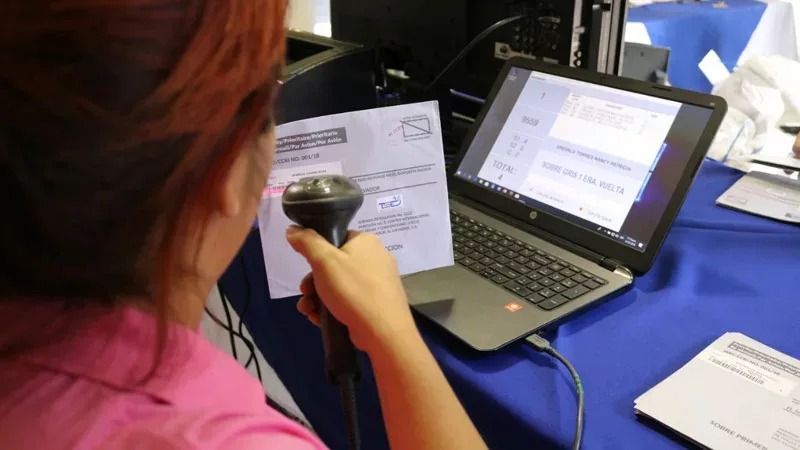The budget bill that the Legislative Assembly has received needs to break down the specific amounts for the contracting of the company that will be responsible for designing the technical programs to be used so that Salvadorans residing abroad can vote electronically. Nor does it define the exact cost of the audits that must be carried out for the entire process to guarantee the transparency and accuracy of the electoral results of 2024.
The document published on the Assembly’s website details that the electoral organization and development for the vote abroad and the auditing of the same will cost $58.9 million. This item contemplates the acquisition of goods and services, while $1 million will be for the payment of remunerations.
Electoral experts have reiterated that the supervision of the electronic voting process is vital since El Salvador will undergo the first time scrutiny of this type. In this regard, it should be recalled that last year the pro-government party reformed the Organic Law of the National Registry of Natural Persons (RNPN) to eliminate the representation and electoral surveillance that the political parties exercised in the Board of Directors of that entity.
In the opinion of the former magistrate of the Supreme Electoral Tribunal (TSE), Eugenio Chicas, not knowing the details of the expenditure is “dangerous.” He says that the Tribunal could sacrifice the audits so crucial in the case of the vote abroad due to the modality in which it will be carried out, remotely by the Internet and electronically in person.
The director of Acción Ciudadana, Eduardo Escobar, emphasized that since “the information on the budget items is not publicly known, he could not give an opinion on whether more resources should be given for the overseas election.” However, Escobar did not rule out that it could be that the implementation of the vote abroad requires a more significant investment at this time because the company that has to develop the software and buy the machines has to be hired.
“What happens is that it is precisely part of the bad design of the law because they do not even know how many machines they are going to have to buy, for example, how many machines of the presential vote, because not only should we think about the vote by internet, but we are talking about all the vote from abroad (electronic presential) and in the case of the national territory the heavy payments, for example, the whole issue of transportation, the payment of the receiving boards are made in 2024”, deepened the electoral expert, Ruth Eleonora López.
Dudas sobre controles y proveedor de tecnología para voto en el exterior
El proyecto de presupuesto que la Asamblea Legislativa ha recibido no desglosa los montos específicos para la contratación de la empresa que será la responsable de diseñar los programas tecnológicos a utilizar para que los salvadoreños residentes en el exterior puedan votar de forma electrónica. Tampoco define el costo exacto de las auditorías que deben realizarse a todo el proceso, para garantizar la transparencia y fidelidad de los resultados electorales de 2024.
En el documento, publicado en el sitio web de la Asamblea, se detalla que la organización y desarrollo electoral para el sufragio en el extranjero, así como la fiscalización del mismo, costará $58.9 millones. Esta partida contempla la adquisición de bienes y servicios, mientras que $1 millón será para el pago de remuneraciones.
Expertos electorales han reiterado que la vigilancia del proceso de voto electrónico es vital, ya que El Salvador se someterá por primera vez a un escrutinio de ese tipo. Al respecto, cabe recordar que el año pasado los oficialistas reformaron la Ley Orgánica del Registro Nacional de las Personas Naturales (RNPN) para eliminar la representación y vigilancia electoral que los partidos políticos ejercían en la Junta Directiva de esa entidad.
A criterio del exmagistrado del Tribunal Supremo Electoral (TSE), Eugenio Chicas, desconocer los detalles en el gasto es “peligroso”. Dice que el Tribunal podría sacrificar las auditorías tan importantes en el caso del voto en el extranjero, por la modalidad en que se llevará a cabo, de forma remota por internet y electrónica presencial.
El director de Acción Ciudadana, Eduardo Escobar, recalcó que como “ no se conoce públicamente la información sobre los rubros del presupuesto no podría dar una opinión en torno a que se de más recursos para la elección del extranjero”. Eso sí, Escobar no descartó que podría ser que la implementación del voto en el exterior requiera una inversión mayor en este momento, porque hay que contratar a la empresa que tiene que desarrollar el software y comprar las máquinas.
“Lo que pasa es que precisamente es parte del mal diseño de la ley, porque ellos no saben ni cuantas máquinas van a tener que comprar, por ejemplo, cuántas maquinas de voto presencial, porque no solo se debe pensar en el voto por internet, sino que estamos hablando de todo el voto desde el exterior (presencial electrónico) y en el caso del territorio nacional los pagos fuertes, por ejemplo, todo el tema de transporte, el pago de las juntas receptoras se hacen en 2024”, ahondó la experta electoral, Ruth Eleonora López.

